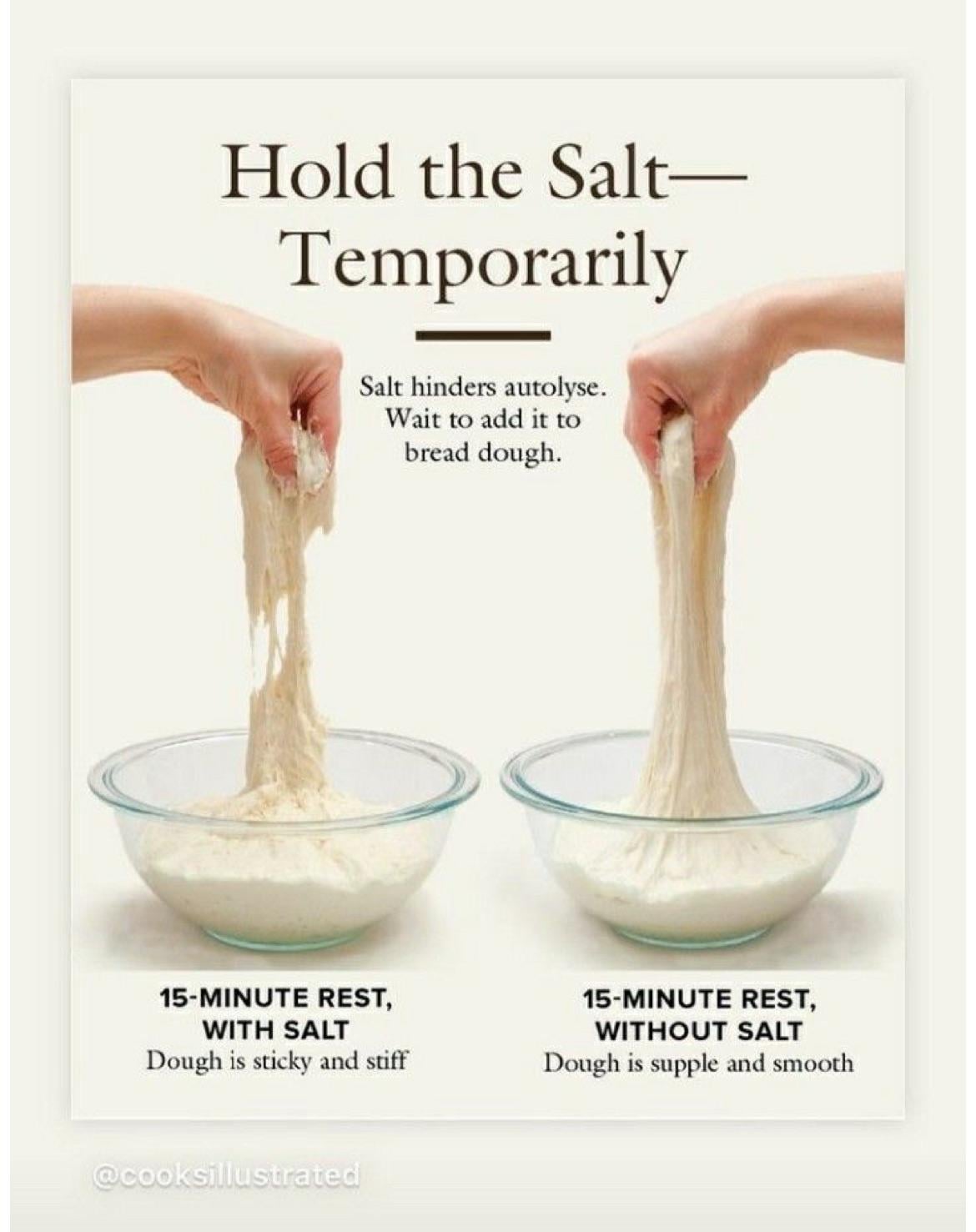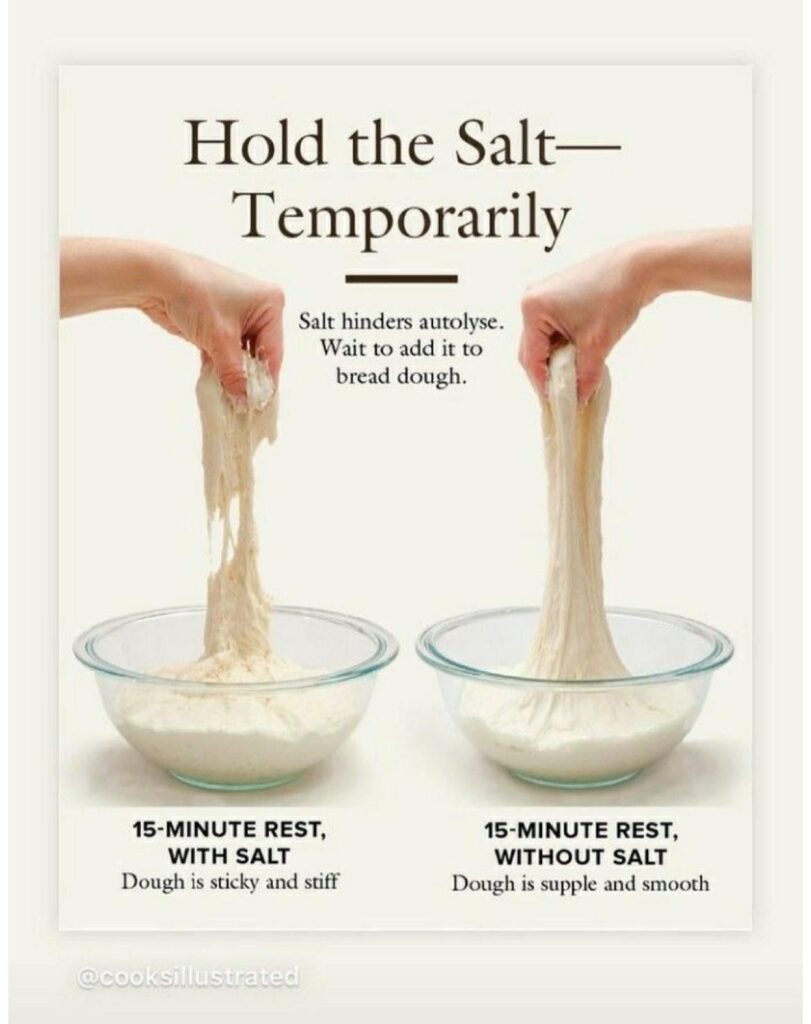
My current recipe: 100g wheat starter, 450g bread flour, 50g whole wheat flour, 375g water, 10g salt calls for it all to be mixed at once, then rest in autolyse for one hour before stretch & folds. When I started my sourdough journey, I only worked with lower (65%) hydration doughs that called for the salt to be mixed in after autolyse, but always found it harder to fully incorporate the salt, and I’m sure I overworked the stiffer dough. Now, though, I’m finding adding the salt initially with all other ingredients hasn’t caused the problem in this photo. Maybe it’s the higher hydration in the new recipe? I like the tighter crumb for sandwiches with a 65% hydration, so is it better to just add the salt at the beginning?
by FlightlessBird9018


44 Comments
**Hello FlightlessBird9018,**
Thank you for posting. **[Here is the posting prompt](https://imgur.com/a/De6AKiQ)** if you need to read it again. **[RULES LINK](https://www.reddit.com/r/Sourdough/wiki/sourdoughrules/)** :-). This comment appears on **all posts**.
**[Modmail us :-)](https://www.reddit.com/message/compose?to=/r/Sourdough)** with questions.
# **[READING CRUMB GUIDE ](https://www.reddit.com/r/Sourdough/wiki/reading_crumb/)**
# [Wiki index](https://www.reddit.com/r/Sourdough/wiki/index/), &
# [FAQ Beginner starter guide](https://www.reddit.com/r/Sourdough/s/gnqFg7osBO)
*I am a bot, and this action was performed automatically. Please [contact the moderators of this subreddit](/message/compose/?to=/r/Sourdough) if you have any questions or concerns.*
I’ve done both and they always turn out the same. Now I don’t care and I add the salt with the other ingredients
Same, I dont see any difference on my bread…
As far as I can tell, adding the salt later merely adds another step.
I’ve always waited to add the salt. That’s how I was taught but now I have to do a side by side comparison. I’m guessing the crystal structure of the salt might slice up the glutin chains when mixed too early? Just guessing.
I autolyse with salt but I go for 1 hour. Who does a 15 min autolyse?
I will usually add the salt during the first round of stretch and folds, but sometimes (like if I don’t have time to do s&fs) I will add everything at once. The only difference I notice is that waiting to add the salt cuts the total bulk fermentation time quite a bit, even if I add it in after only an hour. The downside, as you alluded to, is that it can be tough to get the salt fully mixed in if you add it later.
Just a note on terminology – autolyse is when you mix just the flour and water to begin developing gluten prior to starting fermentation, then add the starter and salt (and any other ingredients like fat) later. If you mix the starter, flour, and water, that is a fermentolyse. If you add the salt from the beginning, you’re really not autolysing or fermentolysing – that’s just, like, making dough. Not trying to be pedantic but knowing the terminology might help with finding the information you’re looking for about the different options for process.
I’ve tried waiting to add the salt, but I can’t really tell the difference. But I’m happy with bread that tastes good and don’t need perfection, if it makes you happy to be a technical purist, be happy.
I add salt to my water before mixing the flour and not once had an issue. To me this is BS
I do a long autolyse with just flour and water. I add salt with bassinage and levain all at once.
What I’ve always found if anything, is that adding the salt later on makes the dough a bit more “rubbery” and a little harder to manipulate in the stretch and fold. So I’ve given up on trying that experiment and I always add salt at the beginning.
Just a correction though, “autolyse” refers to a specific practice where the starter is not added until about an hour after the flour & water (& possibly salt) are mixed.
I do Water, starter and mix to combine, flour, salt, inclusions or spices and mix. Never had too sticky or sloppy dough. I use a 65% hydration and haven’t been disappointed.
I remember the first time I added the salt at the same time as my flour and it was the best loaf I made so I stuck with it
15-30 minutes after mixing in starter.
I rest for an hour then combine the salt, semi-disolved in a little water.
I dissolve the salt in my water, the last water if done in portions
I find it much harder to mix in the salt later than adding it with everything else
I’ve tried both and find it difficult to get it incorporated as nicely if I wait. They turned out exactly the same in the end.
I just say F it. Mix flour with salt. Mix water with starter and combine.
Comes out fine.
I’ve tried both ways, and it turns out the same. I prefer it to be added first.
I add salt after autolyse but not all my recipes autolyse.
fuck it, we salt
Mix everything together at the same time at the start, pretty happy with my bread. Dough seems fine
I do it at the beginning. I’ve tried adding it later and it didn’t make much of a discernable difference. I also sometimes forget to add it later, resulting in a sad wet sponge instead of a delicious loaf of bread. So, all at once from the start for me.
I add the salt at the very beginning, I make a glass of slaty water then add that to my flour and starter. That way I’m sure the salt is evenly incorporated.
When it’s in negative degrees I add salt later to give the dough a head start. Any other time I add it at the same time.
I have salted late before when I realized I forgot but I’ve always added in with the flour before the water and starter
I fermentolyse, rest 45 minutes, then add salt and gently fold it in and transfer the dough to a lightly oiled bowl, then rest another 45 minutes before starting my stretch and folds. I’ve only been baking for a couple of years, so it may not be correct, but it’s worked for me.
I’m always worried how to properly dissolve the salt after Autolyse. It seems if you put the salt on a doughball, it’s more likely to be concentrated in one area of the dough (even after folding).
My yeast and flour though are reactive. Never found an issue with salt in up front.
If you have a strong starter I don’t think it matters
I never add the salt when I do my autolyse. I add it with the starter. I only do it this way because that’s how I do it. Also, the picture is showing that salt will slow the process, but it assumes the goal is to complete autolyse as fast as possible, which may not be the case. I sometimes autolyse before bed and have never noticed any difference between that and doing it for 30 minutes in the morning, despite claims that it is bad practice.
Yeah a guy on YouTube did a great video demo starting this picture is a load of horse manure. Same results regardless of waiting
Ancedotally, I mix the water and flour and let sit for 30 to 60 minutes (autolyse). After that I mix in my levain / starter and _usually_ the salt. However, I occasionally let the dough get to know the levain for 15 to 30 minutes more before adding the salt. Shaggy, wet dough seems to be easier to handle with the extra time. Very non-scientific though
1 hour after mixing
I add all the ingredients (salt included) right away. It’s just one less thing I have to think about later. I can’t feel any difference in taste, so I have been adding all the ingredients from the beginning for the past ~3-3.5 years.
This may be true, but I’d rather have a slower autolyse than forget the salt. Which I know myself well enough to know I’ll do.
Ken Forkish recommends sprinkling the salt on top of the dough after mixing so its there during autolyse. Seems like the best balance of not forgetting to add the salt and giving it time to absorb into the dough without affecting autolyse too much
My heart is growing three sizes seeing all the autolyze-skeptics here 🥹 nature is healing
No difference.
I autolyse for two hours at work and we add the salt halfway through the initial mix.
The only time that I see a difference in my final product (with a true autolyse) is when I’m working with fresh milled flour, ancient grains, and whole grains. Basically anything with less than 30% white bread flour or AP flour. I see absolutely no difference with regular loaves. I churn out a lot of loaves per week as I have a home bakery and yeah, I’m confident with my assessment here!
Higher hydration makes autolyse occur faster. Adding salt slows it down. These often balence out.
My experience is the same as many others in the thread: while excluding salt from the autolyse step makes it faster, it’s extremely tragic to forget the salt. So I add it at the beginning, and allow longer for the autolyse
I am on team autolyse with only flour and water for 1 hour, then in goes starter + salt + 10g water to help absorb salt into the dough. I have definitely noticed better results with autolyse like this when dealing with around 30% WW
The first thing I put in my bowl is the salt. Then I add my water and stir until the salt is dissolved. Then my starter and flour. I’ve tried waiting an hour before adding salt, I haven’t noticed a difference.
https://preview.redd.it/e6oqf48i7izf1.jpeg?width=4000&format=pjpg&auto=webp&s=02ebb999d5159ea20b327af2f3e5ba091d27f959